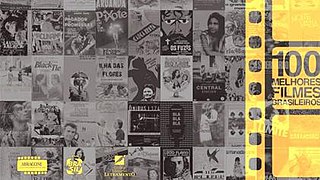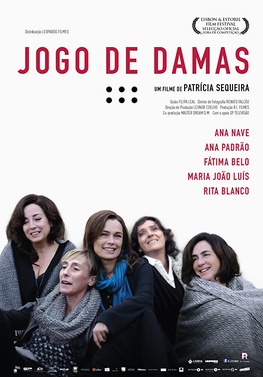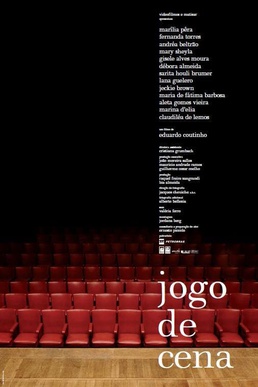The following is a list of Portuguese films that were first released in 2016.
The following is a list of Portuguese films that were first released in 2016.
The following is a list of the 10 highest-grossing domestic films in Portugal that were first released in 2016, as of December 28, 2016, according to the Instituto do Cinema e do Audiovisual (Institute of Cinema and Audiovisual). [1]
| Rank | Title | Gross |
|---|---|---|
| 1 | A Canção de Lisboa | €944,564.76 |
| 2 | O Amor É Lindo... Porque Sim! | €149,533.33 |
| 3 | Letters from War | €110,071.54 |
| 4 | Refrigerantes e Canções de Amor | €56,914.00 |
| 5 | A Mãe É que Sabe | €47,379.62 |
| 6 | Jogo de Damas | €31,537.22 |
| 7 | Axilas | €18,276.61 |
| 8 | The Ornithologist | €18,386.57 |
| 9 | Os Belos Dias de Aranjuez | €12,908.00 |
| 10 | Cinzento e Negro | €7,493.80 |
A motion picture content rating system classifies films based on their suitability for audiences due to their treatment of issues such as sex, violence, or substance abuse, their use of profanity, or other matters typically deemed unsuitable for children or adolescents. Most countries have some form of rating system that issues determinations variously known as certifications, classifications, certificates, or ratings. Age recommendations, of either an advisory or restrictive capacity, are often applied in lieu of censorship; in some jurisdictions movie theaters may have a legal obligation to enforce restrictive ratings.

The Cinema of Portugal started with the birth of the medium in the late 19th century. Cinema was introduced in Portugal in 1896 with the screening of foreign films and the first Portuguese film was Saída do Pessoal Operário da Fábrica Confiança, made in the same year. The first movie theater opened in 1904 and the first scripted Portuguese film was O Rapto de Uma Actriz (1907). The first all-talking sound film, A Severa, was made in 1931. Starting in 1933, with A Canção de Lisboa, the Golden Age would last the next two decades, with films such as O Pátio das Cantigas (1942) and A Menina da Rádio (1944). Aniki-Bóbó (1942), Manoel de Oliveira's first feature film, marked a milestone, with a realist style predating Italian neorealism by a few years. In the 1950s the industry stagnated. The early 1960s saw the birth of the Cinema Novo movement, showing realism in film, in the vein of Italian neorealism and the French New Wave, with films like Dom Roberto (1962) and Os Verdes Anos (1963). The movement became particularly relevant after the Carnation Revolution of 1974. In 1989, João César Monteiro's Recordações da Casa Amarela won the Silver Lion at the Venice Film Festival and in 2009, João Salaviza's Arena won the Short Film Palme d'Or at the Cannes Film Festival. Several other Portuguese films have been in competition for major film awards like the Palme d'Or and the Golden Bear. João Sete Sete (2006) was the first Portuguese animated feature film. Portuguese cinema is significantly supported by the State, with the government's Instituto do Cinema e do Audiovisual giving films financial support.
Vítor Manuel Afonso Damas de Oliveira, known as Damas, was a Portuguese footballer who played as a goalkeeper.

Swan is a 2011 Portuguese film directed by Teresa Villaverde.
Florbela is a 2012 Portuguese biographical film about Portuguese poet Florbela Espanca, directed by Vicente Alves do Ó.

The Gilded Cage is a Franco-Portuguese comedy film released in 2013. The film was Ruben Alves' directorial debut and it was inspired by his parents' life.
The 1st Grande Prêmio Cinema Brasil ceremony, presented by the Ministry of Culture of Brazil, honored the best audiovisual productions of 1999. It took place on February 12, 2000, at the Palácio Quitandinha in the city of Petrópolis, Rio de Janeiro. During the ceremony, the Ministry of Culture presented the Grande Prêmio Cinema Brasil in 17 categories. The ceremony, televised by TV Cultura and Televisão Educativa, was directed by José Possi Neto and hosted by actress Regina Casé.

Mau Mau Maria is a 2014 Portuguese comedy film directed by José Alberto Pinheiro. It was released on 30 October 2014.

In 2015, the Brazilian Film Critics Association (Abraccine) published a list with the 100 best Brazilian films ever according to the votes of its members. This poll was the basis for a book named The 100 Best Brazilian Films, published in 2016. The idea of the ranking and the book was suggested by publisher Letramento, with whom Abraccine and television network Canal Brasil co-released the book. The ranking was done based on individual lists done by Abraccine's 100 critics, who initially mentioned 379 films. The full list was first made available to the public on 26 November 2015, and the book was released on 1 September 2016.

Jogo de Damas is a 2015 Portuguese drama film directed and written by Patrícia Sequeira and Filipa Leal, and starring Ana Nave, Ana Padrão, Fátima Belo, Maria João Luís and Rita Blanco. It premiered on the Lisbon & Estoril Film Festival in November 2015 and was released in Portugal on January 28, 2016.

Playing is a 2007 Brazilian documentary film by Eduardo Coutinho, about the friction between truth and fiction in the cinema.